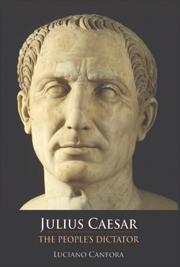Book contents
- Frontmatter
- Contents
- Translators' Note
- Acknowledgements
- Foreword
- PART I FROM SULLA TO CATILINE
- PART II FROM THE TRIUMVIRATE TO THE CONQUEST OF GAUL
- PART III THE LONG CIVIL WAR
- PART IV FROM THE CONSPIRACY TO THE TRIUMPH OF CAESARISM
- 29 Inklings of Conspiracy
- 30 ‘Iure caesus’
- 31 The Lupercalia Drama
- 32 The Dictatorship
- 33 Epicureans in Revolt?
- 34 The Hetairia of Cassius and the Recruitment of Brutus
- 35 A Conspirator's Realism: Cassius Settles for the Second Rank
- 36 Some Unexpected Refusals
- 37 Cicero – an Organiser of the Conspiracy?
- 38 The Serious Mistake of Dismissing the Escort
- 39 The Dynamics of the ‘Tyrannicide’
- 40 ‘Where's Antony?’
- 41 Caesar's Body: How to Turn Victory into Defeat
- 42 The Wind
- Chronology
- Bibliography
- Index
32 - The Dictatorship
from PART IV - FROM THE CONSPIRACY TO THE TRIUMPH OF CAESARISM
Published online by Cambridge University Press: 05 August 2013
- Frontmatter
- Contents
- Translators' Note
- Acknowledgements
- Foreword
- PART I FROM SULLA TO CATILINE
- PART II FROM THE TRIUMVIRATE TO THE CONQUEST OF GAUL
- PART III THE LONG CIVIL WAR
- PART IV FROM THE CONSPIRACY TO THE TRIUMPH OF CAESARISM
- 29 Inklings of Conspiracy
- 30 ‘Iure caesus’
- 31 The Lupercalia Drama
- 32 The Dictatorship
- 33 Epicureans in Revolt?
- 34 The Hetairia of Cassius and the Recruitment of Brutus
- 35 A Conspirator's Realism: Cassius Settles for the Second Rank
- 36 Some Unexpected Refusals
- 37 Cicero – an Organiser of the Conspiracy?
- 38 The Serious Mistake of Dismissing the Escort
- 39 The Dynamics of the ‘Tyrannicide’
- 40 ‘Where's Antony?’
- 41 Caesar's Body: How to Turn Victory into Defeat
- 42 The Wind
- Chronology
- Bibliography
- Index
Summary
Caesarism […] is entrusted with the task of ‘arbitration’ over a historico-political situation characterised by an equilibrium of forces heading towards catastrophe.
GramsciIt was the ‘expansion’ of the dictatorship that led to the crisis. Caesar's decision to identify his own real power (unprecedented in its extent) indefinitely with the traditional, constitutional dictatorship was not in reality a matter of choice. The dictatorship was the only instrument that allowed him freedom of action with respect to his followers. Here we shall review the stages through which the ‘revitalisation’ of the dictatorship had been achieved by the beginning of the civil war.
In an aside in the second book of his Commentaries on the civil war, in admirably modest and impersonal style, Caesar reports his own nomination as dictator. Returning home from Spain (August–September 49 bc) he passes through Tarragona, then Narbonne, and finally Marseilles. ‘There he learns that a law had been passed about a dictator, and that he himself had been nominated dictator by the praetor M. Lepidus.’ Apart from the pleasant ‘surprise’ with which Caesar learns that he himself has been nominated to the dictatorship, we should note the constitutional difficulty. According to the current regulations, the dictator had to be nominated by a consul: but in 49 both the consuls, Gaius Claudius Marcellus and Cornelius Lentulus Crus, had fled from Italy with Pompey.
- Type
- Chapter
- Information
- Julius CaesarThe People's Dictator, pp. 287 - 295Publisher: Edinburgh University PressPrint publication year: 2007



